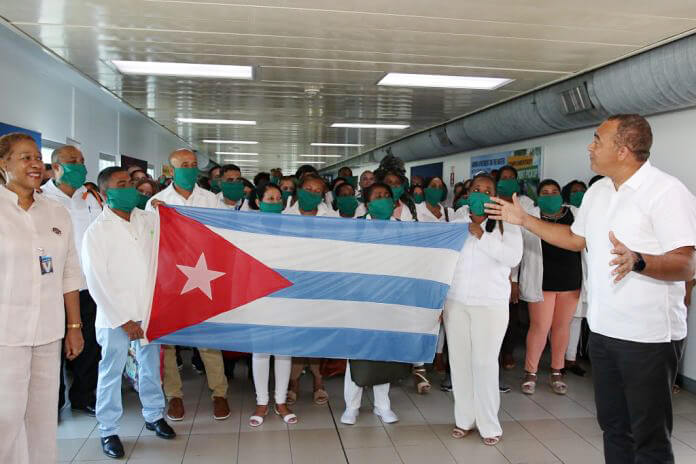With the Trump administration vowing to deal with nations and groups with links to terrorism, two Caribbean Community countries were unfortunately forced to publicly deal with such issues this week, including tourist paradise The Bahamas which was surprisingly picked out by an alleged expert on United States television network MSNBC as having such connections.
Quickly moving to rubbish such claims, Prime Minister Perry Christie said The Bahamas’s would have been forewarned by federal officials if such were the case because the chain of idyllic islands has well established diplomatic and other links with the United States.
“We would have known, and I’m sure our law enforcement officers would have been made aware of it, because there is tremendous collaboration between the law enforcement agencies in the United States of America and The Bahamas, and there would have been a great sharing of intelligence in that regard, and we would have known. So I’m relieved that it is not true, and therefore every effort be made to convince the people that Bahamians are not that kind of grouping who have been attracted to do those sorts of things,” he charged.
Far away down south in Trinidad, Security Minister Edmund Dillon took to the floor of the Senate to indicate that dozens Trinidadian nations, including adults and family members, have left the region’s most southerly island to fight alongside ISIS and other terror groups or to live in countries in the Middle East.
“Based on our information at this point in time, there are approximately 130 nationals who have left T&T involved in terrorist activities in countries away from T&T. Information at hand right now reflects about 70 adults and roughly about 58 family members.”
Wiser critics of both administrations would presumably have urged both governments to remain quiet rather than go public and bring unwanted attention to themselves at a time when the air is thick with a rabid, right-wing Republican administration which has vowed to bring in a new world order.
But both governments appeared to have been prepared to come out swinging in relation to commentator Malcolm Nance’s recent accusations that the two Caribbean states have more terrorists than the seven countries which the White House slapped travel bans on in weekend executive orders. The Bahamas has already demanded an apology for a statement which it considers could affect its tourism sector, which sometimes caters for up to four million American and western stay over and cruise visitors annually.
Trinidad, on the other hand, said that the oil and gas-rich republic “is currently experiencing challenges with some T&T nationals being linked to terrorist groups internationally.”
Prime Minister Keith Rowley dismissed the comparison as a “broad and simplistic statement that wasn’t supported by fact.”
But even as the two try to dismiss country links to international terrorism, Jamaica was forced to advise panicky citizens that the current travel ban for some countries will not affect them, at least not yet.
“We just need to be calm. We will be having discussions with our international partners to have all the concerns addressed. We don’t want any panic because there have been no definitive actions taken of which Jamaica is directly impacted,” Information Minister Senator Ruel Reid said. Trinidad’s Foreign Minister Kamina Johnson Smith also appealed for calm.
“It is very important in these matters that we remain calm and responsible. It is extremely unhelpful that people are inciting panic on matters that are very complex and very technical and subject to a lot of uncertainty, even in the issuing state,” she said.
All the official explanations, the hype and the panic among visa holders and intended immigrants come as well known Caribbean American Congress woman Yvette D. Clarke has warned that the ban could be extended to the Caribbean even as she did not identify any nations.
“I am concerned that he could expand that if we don’t organize and push back now. We know that in the Caribbean region there is a very healthy Muslim population from Guyana, to Trinidad, to Jamaica across the board so we have to make sure we come together. We cannot, as a nation, allow xenophobia to undermine our principles or racism to determine our policies. These are the same individuals who have volunteered for service in the Armed Forces. These same individuals are our neighbors and friends,” CMC News Agency reported her as saying.




















